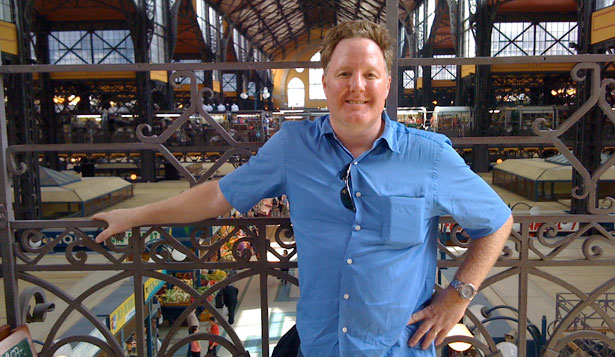Web Feature Posted March 24, 2011
The Making of Let Justice Roll On
A Conversation With Filmmaker Michael Eaton
By Hope McPherson (hmcpherson@spu.edu)

Filmmaker Michael Eaton worked with Seattle Pacific University to create the first documentary about an African-American Christian leader in about 60 years.
Because this filmmaker listened when his dad suggested he create a documentary about John M. Perkins, in April 2011, Seattle Pacific University hosts the premiere of Let Justice Roll On: The Life and Legacy of John M. Perkins. A culmination of nearly two years of filming in locations across the country, the documentary was created by filmmaker Michael Eaton, son of Seattle Pacific President Philip Eaton.
Based in Southern California, Eaton has been directing for more than a decade; he says this documentary was one of his favorite kinds on which to work. “My goal is to make movies that engage the hearts and minds of viewers in a profound way about substantive cultural, spiritual, and social issues,” he explains. “I am most passionate about projects like this, and it was such a privilege to work with John Perkins, as well as everyone at SPU, on this project.”
Response asked Eaton for some behind-the-scenes information about this film.
Did you know much about John Perkins before you began filming?
I first heard about Dr. Perkins though my father, SPU President Philip Eaton, in 2004 when the Perkins Center was founded at Seattle Pacific University.
Then, in 2007, near the release of my documentaries Soul Searching and The Case For Christ, Dr. Eaton began discussing with me the possibility of a documentary focusing on the life and legacy of Dr. Perkins.
I read his autobiography, Let Justice Roll Down, in early 2008 and went to see Dr. Perkins speak at an Urban Youth Workers Institute conference at Azusa Pacific University. That’s when I got really excited about the possibility of filming a full-length documentary about the life and legacy of John and Vera Mae Perkins.
Where did you film Let Justice Roll On?
I got the "green light" to film on March 12, 2009, and I began filming in Jackson, Mississippi, a week later, on March 20, 2009.
In June 2009, I filmed again with Dr. Perkins when he received his 10th honorary doctorate at SPU’s Commencement ceremonies in Seattle. I also filmed in Chicago and in Pasadena, California, where John and Vera Mae Perkins founded the Harambee Center.
After screening the first cut of the movie at the Christian Community Development Association conference in Cincinnati in October 2009, we decided to film the 50th anniversary celebration of the Perkins ministry — which took place in Jackson, Mississippi, in June 2010 — and it would be a wonderful addition to the movie. So Tali Hairston, director of the Perkins Center at SPU, and I went again to Jackson in June to film that event. In December 2010, I completed a “fine cut” of the movie from which to decide on final changes.
How many individuals are included in the documentary, talking about Dr. Perkins and his work?
We ended up with more than a dozen people talking about Dr. Perkins and his legacy. They included former Mississippi Governor William Winter; Hinds County Sheriff Malcolm McMillan; CCDA President Noel Castellanos; Medgar Evers’ brother and former NAACP head Charles Evers; Lawndale Christian Development founder Wayne "Coach" Gordon; Mississippi Mission director of development Dolphus Weary; Mendenhall Ministries executive director Artis Fletcher; Bishop Ronnie C. Crudup Sr.; Elizabeth Perkins; Vera Mae Perkins; SPU’s President Eaton; and director of the Perkins Center at SPU, Tali Hairston. There was a handful of others, as well!
The challenge with this documentary was to convey the impact that Dr. Perkins has had on so many people throughout his ministry not just with words — with people telling us about that impact — but visually, where the viewer sees that impact in action. This film is about the Perkins’ daily interaction with people within their neighborhoods, in their life choices about where to live, and how they serve God. And not just to see it, of course, but to feel it.
Stephen Newby, SPU’s director of University Ministries and the Center for Worship, composed and recorded some fantastic music for the film that works so well with the visuals and with the content. It helps to give the movie the impact that we hope it will have.
Has your view of Dr. Perkins changed over the course of filming?
That's the wonderful thing about documentaries that I just love. I get to go into the life and mind of an individual, or individuals, and develop a relationship. Then I try to tell the story of their life and vision in a thoughtful and intimate way.
It's such a privilege, really, especially with such a great man and mind like Dr. Perkins. Like so many others, my life has been changed and greatly impacted by being in the presence of Dr. Perkins and his vision.
Our goal was to capture his vision not just at this moment in time, but also for all time. Generations from now, the Perkins Center at SPU and the world will have this record — along with Dr. Perkins’ books and other media — of the man and his mind, as well as the story of how God transformed his life and inspired him to develop a profoundly Christian vision for racial reconciliation and community development.
